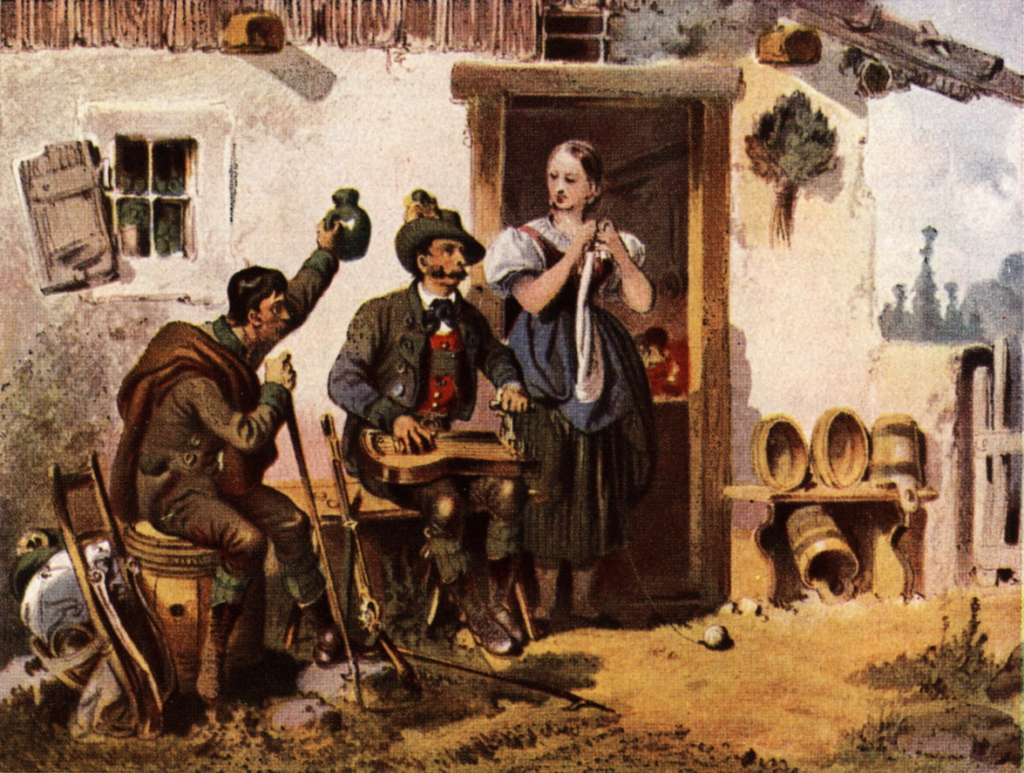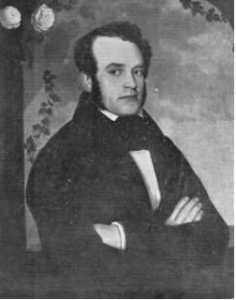What the singer has
(Poet's title: Des Sängers Habe)
Set by Schubert:
D 832
[February 1825]
Schlagt mein ganzes Glück in Splitter,
Nehmt mir alle Habe gleich,
Lasset mir nur meine Zither,
Und ich bleibe froh und reich.
Wenn des Grames Wolken ziehen,
Haucht sie Trost in meine Brust,
Und aus ihrem Golde blühen
Alle Blumen meiner Lust.
Will die Liebe nicht gewähren,
Freundschaft brechen ihre Pflicht,
Kann ich beide stolz entbehren,
Aber meine Zither nicht.
Reißet meines Lebens Sehne,
Wird sie mir ein Kissen sein,
Lullen mich die süßen Töne
In den letzten Schlummer ein.
In den Grund des Tannenhaines
Senkt mich leise dann hinab
Und statt eines Leichensteines
Stellt die Zither auf mein Grab,
Dass ich, wenn zum stillen Reigen
Aus des Todes dunklem Bann
Mitternachts die Geister steigen,
Ihre Saiten rühren kann.
You can smash everything that I have been blessed with into pieces,
You can even take everything from me that I own,
Just leave me my zither,
And I shall remain happy and rich.
When the clouds of grief approach
It breathes solace into my breast,
And blossoming out of its golden strings
All the flowers of my pleasure appear.
If love does not grant me anything,
If friendship fails in its duty,
I can proudly manage without either of those,
But not my zither.
If the longings of my life are torn apart,
It will become a pillow for me,
Its sweet notes will lull me
Into my final slumber.
In the soil of a grove of fir trees,
Lay me down gently there:
And instead of a memorial stone
Set up the zither on my grave,
So that, when there are quiet dances
As people are released from the dark spell of death
And spirits rise up at midnight,
I can strum its strings.
All translations into English that appear on this website, unless otherwise stated, are by Malcolm Wren. You are free to use them on condition that you acknowledge Malcolm Wren as the translator and schubertsong.uk as the source. Unless otherwise stated, the comments and essays that appear after the texts and translations are by Malcolm Wren and are © Copyright.
☙
Themes and images in this text:
Bards and minstrels Breaking and shattering Breath and breathing Chest / breast Clouds Dancing Flowers Ghosts and spirits Gold Graves and burials Lullabies Longing and yearning Midnight Stringed instruments (unspecified) Sweetness Trees (general) Woods – groves and clumps of trees (Hain) Zithers

Although we usually imagine bards or minstrels singing their songs to the accompaniment of a lyre or a harp, it really depends on the time and place. We associate singers in America with banjos and guitars (or even mouth organs in the case of Bob Dylan). Indian classical singers work with players of the sitar and the tabla. Although the piano was central to Schubert’s song writing, in his central European world the zither was common, particularly in outdoor music making in rural areas (such as Zseliz, where he spent two summers).

Graham Johnson speculates that Schlechta wrote this poem to console Schubert at a time when he needed further treatment for syphilis and he was therefore facing the prospect of losing everything he valued. As he looked ahead he could foresee poverty and, even worse, the loss of his reason and perhaps, even, the loss of his ability to create or play music. It is this that he begs to be allowed to hold on to.
Schlechta knew Schubert not just as a ‘singer’ (and song writer, of course), but also as an instrumental player. In particular, he was the piano player who accompanied dances at night. The final stanza of the poem therefore looks forward to a time when all the friends of the Schubert circle would continue their dance, even after death. The chimes of midnight would raise the spirits and they would all join in the dance, as their friend continued to play for them.

☙
Original Spelling Des Sängers Habe. Schlagt mein ganzes Glück in Splitter, Nehmt mir alle Habe gleich, Lasset mir nur meine Zither, Und ich bleibe froh und reich. Wenn des Grames Wolken ziehen, Haucht sie Trost in meine Brust, Und aus ihrem Golde blühen Alle Blumen meiner Lust. Will die Liebe nicht gewähren, Freundschaft brechen ihre Pflicht, Kann ich beide stolz entbehren, Aber meine Zither nicht. Reißet meines Lebens Sehne, Wird sie mir ein Kissen sein, Lullen mich die süßen Töne In den letzten Schlummer ein. In den Grund des Tannenhaines Senkt mich leise dann hinab; Und statt eines Leichensteines Stellt die Zither auf mein Grab, Daß ich, wenn zum stillen Reigen, Aus des Todes dunklem Bann, Mitternachts die Geister steigen, Ihre Saiten rühren kann.
Note: Schubert received Schlechta’s poem in handwritten form. Schlechta’s poem was posthumously printed in a substantially revised version in Ephemeren
To see an early edition of the text, go to page 30 [54 von 346] here: http://digital.onb.ac.at/OnbViewer/viewer.faces?doc=ABO_%2BZ255682509


